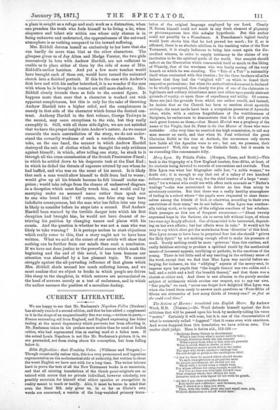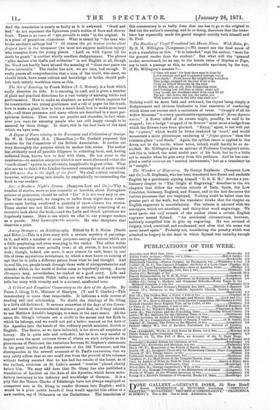The Satires of Horace: translated into English Metre. By Andrew
Wood, M.D. (Nimmo.)—Dr. Wood defends himself against, the first criticism that will be passed upon his book by modestly calling his verse "metre." Certainly it will scan, but it is one of the characteristics of what is commonly called "doggerel" that it scans even with exactness. And worse doggerel than this translation we have seldom seen. The reader shall judge. ' Here is Satire xiii., 113-124 :—
"Methinks Dame Nature to discriminate What's just from what's unjust entirely fall,; Though doubtless fairly she can separate What's good from what is bad, and aye prevails What to avoid, what to desire, to state ; And Reason cannot prove that in the scales The man who broke another's cabbage-leaf Should weigh as guilty as the sacrilegious thief.
"A law let there be passed which should decree To each transgression in proportion meet Its proper punishment, we should not see Them with a horrid strap a culprit best, For whose offence the strap enough would be ; For I've no fear you with light rod will treat That criminal whose dire offence the lash
Deserves laid on with vigour till his teeth he gnash.
"All this I say, since you alike declare
E'en thefts and robberies; and threaten, too, That if elected as a king you were
Then, with like knife, great sins and small ones, you,
Without distinction to cut off would dare."
And the translation is nearly as faulty as it is awkward. "Good and bad" do not represent the Epicurean poet's notion of bona and diversa bonis. There is no trace of "aye prevails to state" in the original. It is a piece of gratuitous clumsiness. What is meant by "the man who broke another's cabbage-leaf "? Of coarse the qui teneros cattles alieni fregerit horti is the trespasser (we must not suppose malicious injury) who tramples down the young plants. "Laid on with vigour till his teeth he ash" is another wholly needless disfigurement. The phrase "alike declare e'en thefts and robberies" is not English at all, though Dr. Wood can hardly have missed the meaning of "dices esse pares res Parts latrociniis." The reader has now, we are sure, had enough. It really passes all comprehension that a man of the world, who must, we should think, have some culture and knowledge of books, should pub- lish such utterly worthless verse as this.



































 Previous page
Previous page